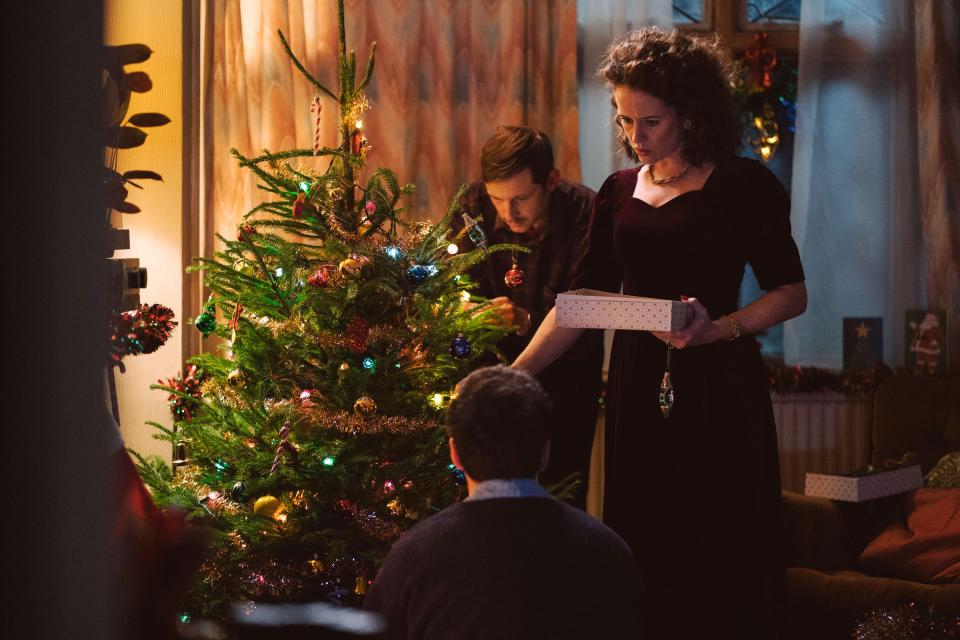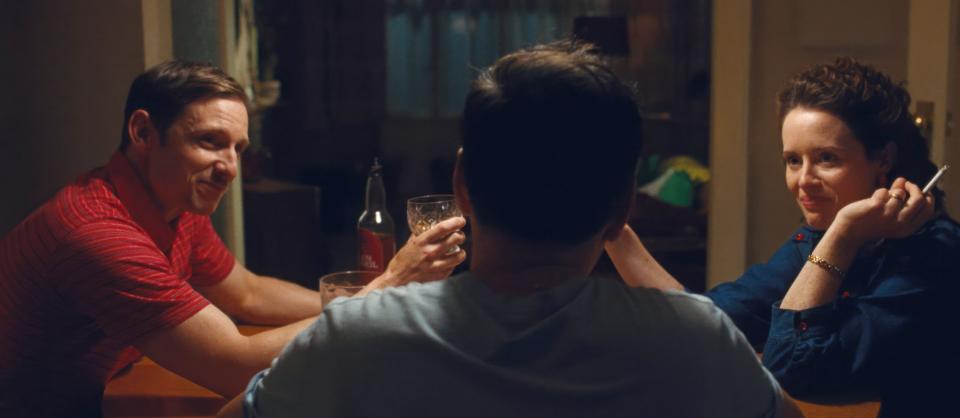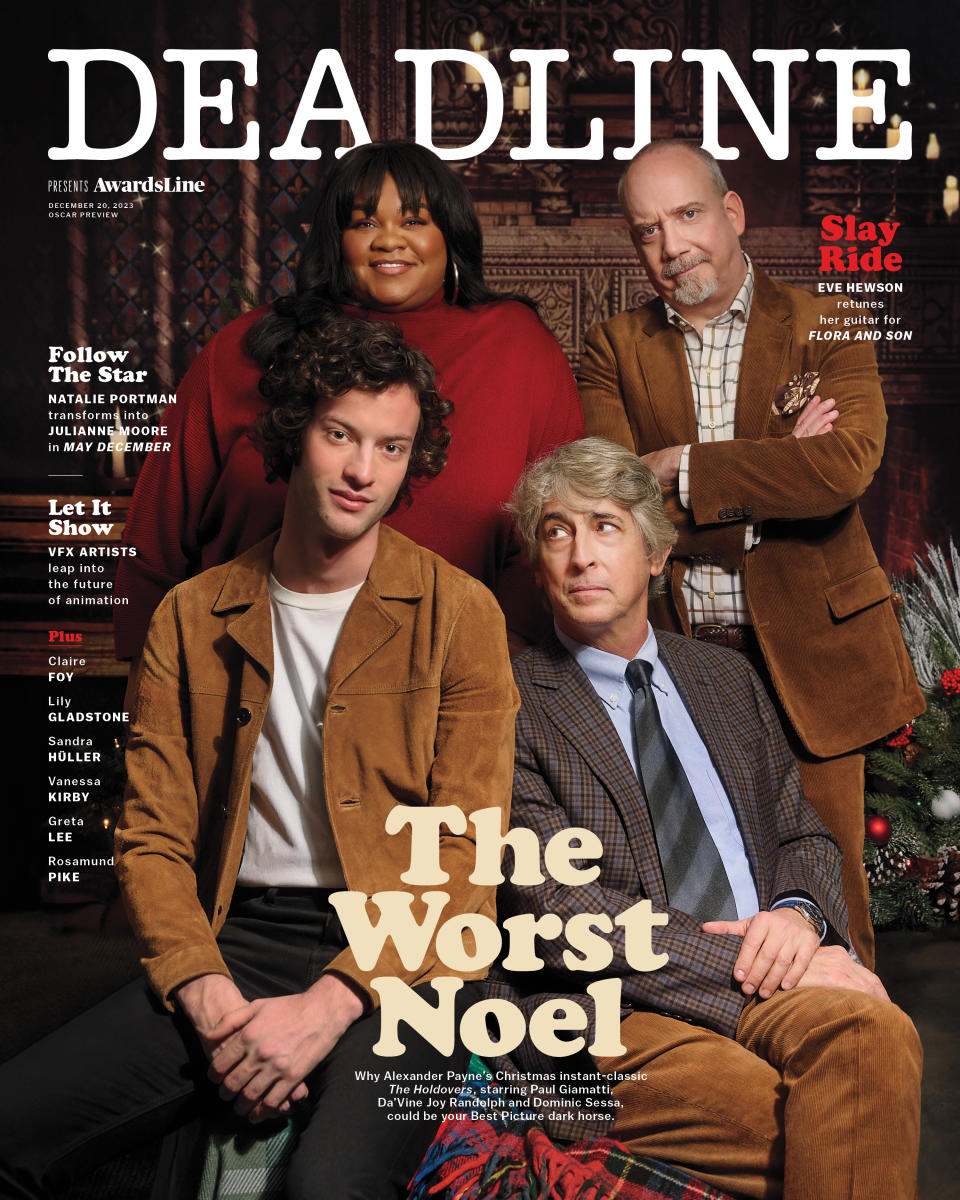‘All Of Us Strangers’ Star Claire Foy Tells Some Hard Truths In Director Andrew Haigh’s Supernatural Love Story
- Oops!Something went wrong.Please try again later.
- Oops!Something went wrong.Please try again later.
- Oops!Something went wrong.Please try again later.
- Oops!Something went wrong.Please try again later.

Actress Claire Foy is ready and braced for a lot of personal reactions to her latest film All of Us Strangers. Adapted from Taichi Yamada’s novel Strangers, writer-director Andrew Haigh’s emotional reimagining finds gay screenwriter Adam (Andrew Scott) working on a script inspired by a devastating personal tragedy: in the early ’80s, both his parents died in a car crash when he was just 12. Seeking inspiration, Adam travels back to his childhood neighborhood where he encounters his parents (Claire Foy and Jamie Bell) — not only still living in his former home but looking exactly the same as the last time he saw them.
DEADLINE: How did you first hear about All of Us Strangers?
More from Deadline
CLAIRE FOY: It was actually three or four months before we started shooting. One of my agents, Billy Lazarus, had a very, very emotional response to it, and I knew that it was something quite special. Then I met Andrew [Haigh] and he’s just so open as a person, and unassuming about what he does, which is so encouraging because what he does is so tender and truthful and not precious in any way. I just thought, it’s going to be really special to be a part of this film.
DEADLINE: Did Andrew tell you whether your role of Mum was loosely based on his own mother? Or was it less specific?
FOY: I don’t know whether he was basing it on his mother or a generational group of parents who were the children of war babies in the U.K. And that’s quite a specific generation of people. You have a specific set of values and beliefs that have come out of the war generation about how they were brought up, what you do and don’t do, how you express yourself, what you talk about and don’t talk about. And then it’s like, someone like Adam is the fruit of those people.
I’m from a family where there’s a hell of a lot of women. I’ve got so many aunts in my family, so ‘mum’ became an amalgamation of the many different women in many different moments to me.
DEADLINE: When you knew that Jamie Bell was going to play your husband, did you spend some time with him to work on the relationship we see on screen?
FOY: Not really. I had never met him before in my life, and so when he signed up, I just knew that it wouldn’t be a problem. I think I have loved Jamie Bell since Billy Elliot, as everybody else in the world, and sort of feel a deep affection for him. He’s so engaged all the time, and his emotions are so close to the surface. It’s the most beautiful thing to see in a man that has such access to it all the time.
DEADLINE: It sounds like all the family moments between you, Jamie and Andrew were really natural to shoot.
FOY: I can’t really put my finger on what it was, but it was the coming together of three people who’d known each other a long time. And it was immediate. We were all there. We were kissing each other on the lips to say goodbye in that scene where we say goodbye. And it could have been a sort of weird thing where Adam is kissing his parents on the lips as an adult, but it just didn’t feel weird. It just felt so right. And I just don’t think you can fake things like that. I just think that’s incredible casting by Andrew [Haigh] in that he knew we’d all get on. But we’re also quite similar to Andrew, to the point where we had very little friction ever on set.
DEADLINE: Is it true that this is the first film where you’re not performing with an accent?
FOY: I was very much gunning for being Irish. My family is Irish, and I’ve always said I’m going to do an Irish accent in a film. There wasn’t a lot of prep time, but I was like, I don’t think it’s going to be a problem. So, I spoke to my friend who’s a dialect coach, and I went, “Here’s my Irish accent.” And he went, “OK, so the problem is, you speak with the accent of someone who lived in Ireland a hundred years ago and was a rural farmer.” I guess my accent was inspired by Barry, my granddad, who is 94 now [laughs]. But what’s so amazing about this film, is that it suspends everyone’s reality. Adam moved back to Ireland with his nan after his parents died, and hence he’s Irish and they’re not.

DEADLINE: The moment when Adam comes out to his mother is quite tough to watch. She doesn’t respond in a way that he hoped.
FOY: It’s not sentimental. Andrew Haigh had written it as complicated. I feel like Adam’s journey in the film is one that isn’t tied up in a bow. He has suffered a great tragedy. His parents died at the beginning of his adolescence. It’s terrible to lose to your parents in any way, but for Adam about to step out into the world, he doesn’t have them in a formative period of his life. That in itself is so heartbreaking.
It was really interesting being invited into that scene from a position of having the two Andrews talking about their own experiences. I think Andrew Scott didn’t want it to be a coming out scene. He didn’t want it to be that he had gone there to his mum’s house with the idea that he had to come out. Because he’s a man in his forties, and has an understanding of himself and his sexuality. There was no unresolved business there for him.
I didn’t want my modern sensibilities to get in the way of the fact that whilst everything she says is said dripping in love, he feels judged just by virtue of what she’s saying. I think it would short-change both the audience and the characters to make her say the right thing. I think it had to be that scenario where you had to see the difference in a time period that they haven’t had with each other.
DEADLINE: She’s also processing the information at the same time.
FOY: When we try to understand off thoughts and emotions, that’s when people get hurt because it comes out before you assimilate in your brain. I think she felt upset about missing so much out on his life. She didn’t know what his teenage years were like. She didn’t know what his twenties or his thirties were like. She didn’t know any of that. And then to have your son say something so fundamental about who he is, and she doesn’t know it, I think she’s deeply wounded by that and goes on the defense in a mundane way.
I felt a very strong instinct that she felt she was being criticized. Everything about who he was now as a person was an indication of how she hadn’t fulfilled her job as the mother properly. Everything is an exclusion from his life because she died. Because if she had lived, then she wouldn’t have a gay son. She would have a son who was married with twenty-five children and living in a house. It was really interesting because I genuinely felt like everything Andrew was doing was a criticism.
I also didn’t want to make her nicer. I didn’t want to make her say the right things. I wanted it to be truthful. I knew when I was shooting it that people would have visceral reactions to my portrayal of that person and they’re completely entitled to it. In fact, it is most truthful how these interactions go from what I have learned.
DEADLINE: Was there ever a scene that was even too much emotionally for you to be in?
FOY: The final scene in TGI Fridays with me, Andrew and Jamie. Sometimes something happens in a scene where you think it’s going to be one thing, you do all your prep, you have in your head what you think your character wants out of the scene and then an actor does something and it changes everything.
So Jamie just sat down and we did this bloody scene, and by the end, Andrew and I were just like howling, crying. All three of us were just bawling our eyes out and we were like, this is wrong. We shouldn’t be like this. It was really, really incredible. I suppose I believed everyone so much that I was just in there with them. And then at the end I just worship and bow down to them. That’s what I do.

DEADLINE: I have to ask, what is it like to have Andrew Scott climb into his parents bed in his childhood PJs?
FOY It didn’t feel weird. (laughs) The way Andrew was playing it was so childlike and I think me and Jamie have kids so were so used to that dynamic of, all right, come on in. The only thing about that was Paul Mescal was also in the bed because the scene then switches to Andrew being in bed with him at home. And so there was the added element of, “What’s going on here? I’m in bed with these three men. What’s happened to my life?”
DEADLINE: That’s a photo many people would like to see.
FOY: There is a photo! I’m hoping no one ever sees because I look like a competition winner and I could not be happier to be there. They look really cool and just like, “Yeah, whatever.” And I’m like, “Ahhhhhh!!!” It’s so embarrassing. No one’s ever seeing that photo. I’ll just have it for the rest of my life. I’m going to get it framed. (laughs)
DEADLINE: What is it like to work under the direction of Andrew Haigh?
FOY: He’s very similar to Sarah Polley, who I’ve worked with [on Women Talking]. Like Sarah, he doesn’t pretend to be the big all-knowing director. He often says, “I don’t know.” He’s very human and you feel like you’re genuinely having a conversation with him. I love how he picks up on little things you’re doing. He’s very observant. He’s also just a very kind person, very funny, very cynical, but also full of hope and love, and that’s made him a great director. As someone who is interested in human beings, I feel like he wants to get to the heart of most things in a truthful, honest way.
DEADLINE: The film is very subtle in its portayal of the ghosts that haunt Adam, and the way his denial of the past catches up with him.
FOY: There’s a scene in the film where Adam tells his new boyfriend Harry [Paul Mescal] about the fact that his parents died. And I think it’s the most brilliant piece of acting because it could be, “My parents died when I was 12.” But what he does is he says, “Oh no, it’s not a big deal,” because the trauma and the pain and the loss is so deep in his body, in his muscle, in his bones, he can’t touch it. He’s desensitized to it. This is what I’m projecting onto him in the film. He can’t access that, and the film is all about him attempting to access that grief in some way in order to be able to allow himself to love someone again.

I can think of nothing braver than losing someone you love and then being brave enough to try the whole thing all over again because what a terrifying concept that is. You have to live in denial or live every day knowing they could go, because either way, you can’t deal with it. It’s too much, that human connection. And it’s the one thing that makes human beings incredibly special is that we have the ability to do that.
To play the smells, the textures, the feeling of having parents — I think that’s what he misses his whole life. He didn’t have them, and then suddenly he has them, and he doesn’t want to leave them.
In the end, we’re all going to the same place. We like to pretend we’re not, but we’re all going to die. And inevitably it involves people being left behind. And that’s just the most incredibly painful concept, I think, of what it is to be alive.
Best of Deadline
2023 Premiere Dates For New & Returning Series On Broadcast, Cable & Streaming
2024 Premiere Dates For New & Returning Series On Broadcast, Cable & Streaming
Sign up for Deadline's Newsletter. For the latest news, follow us on Facebook, Twitter, and Instagram.

